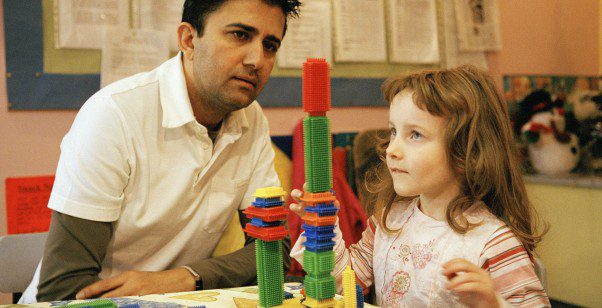The Nuffield Foundation called for proposals on the development and early evaluation of early years interventions that aimed to improve outcomes for disadvantaged children.

The call was part of a new strategic partnership with the Education Endowment Foundation (EEF) that will deliver an end-to-end approach to building evidence in early years interventions, from development and early evaluation, through to large randomised controlled trials (RCTs) and scale-up of successful approaches.
Why early years?
Gaps in outcomes begin to emerge between children from advantaged and disadvantaged backgrounds from the earliest stages of learning. At the start of school, children from the poorest backgrounds are estimated to be 19 months behind their most affluent peers of the same age in development of vocabulary.
While there is some high-quality evidence about ‘what works’ in the early years – for example, the EEF’s Early Years Toolkit highlights approaches underpinned by robust research – there is very little evidence available to indicate which specific interventions are most effective in improving children’s learning and development.
The Nuffield Foundation will fund the development and early evaluation of early years interventions that seek to improve outcomes for disadvantaged children, but that currently have a limited evidence base. The aim is that they will develop the evidence to a sufficient level to make it a strong candidate for future EEF funding, likely through a larger scale randomised control trial (RCT).
Josh Hillman, Director of Education at the Nuffield Foundation said:
“The Nuffield Foundation has a strong track record in funding the development and initial evaluation of promising early years interventions. Projects such as the Nuffield Early Language Intervention are able to qualify for large-scale evaluation by the EEF because of initial investment and continued engagement from the Nuffield Foundation.
“This partnership with the EEF will enable us to capitalise on that success by creating a pipeline for early years interventions from development stage to large-scale trials. Ultimately, this will mean that more children benefit from approaches that have been proven to improve outcomes during this critical period of children’s development just before they enter primary education.”
Sir Kevan Collins, Chief Executive of the Education Endowment Foundation, said:
“There is extensive research demonstrating an attainment gap in the early years, the impact of this gap on later educational outcomes, and the value of high-quality early years provision for disadvantaged pupils. We also know a fair amount about the strategies which are most effective for young children, notably improving communications and language, parental engagement, and self-regulation.
“However, there is less strong evidence to indicate which specific interventions are most effective in improving children’s learning and development. The EEF has made a good start in commissioning trials in the early years, but we know there are lots of good ideas out there which need some development support first.
“Our new partnership with the Nuffield Foundation aims to create just such a pipeline, to build the evidence base of ‘what works’ in the early years. It will enable organisations with innovative ideas to test and learn, giving them the support they need to put together strong applications for EEF trial funding.”
This call is now closed.


















































